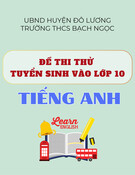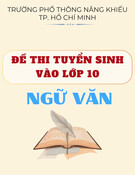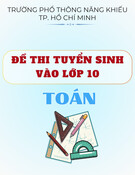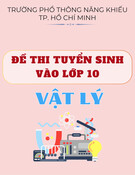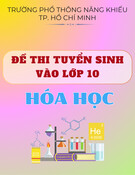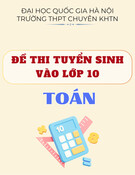
1
CHUYÊN Đ Ề
ÔN THI VÀO L P 10 THPTỚ
Môn: Ti ng Anhế
===============
- Ng i vi t chuyên đ: ườ ế ề Ph m Th Hàạ ị
-Ch c v : TTCMứ ụ
- Đn v công tác: Tr ng THCS H ng S nơ ị ườ ươ ơ
- Tên chuyên đ:ềVERB FORM
- Đi t ng h c sinh:ố ượ ọ L p 9 ớ
- D ki n s ti t d y: 18 ti t (6 bu i).ự ế ố ế ạ ế ổ
PH N A: TH C TR NG CH T L NG THI TUY N SINH VÀO L P 10Ầ Ự Ạ Ấ ƯỢ Ể Ớ
C A ĐN V NĂM H C 2021 - 2022Ủ Ơ Ị Ọ
Trong nh ng nămv a qua, công tác nâng cao ch t l ng h c sinh l p 9 vàữ ừ ấ ượ ọ ớ
tuy n sinh vào l p 10 đã đc Phòng Giáo d c và Đào t o Bình Xuyên nóiể ớ ượ ụ ạ
chung, tr ng THCS H ng S n nói riêng đc bi t quan tâm. Tr ng THCSườ ươ ơ ặ ệ ườ
H ng S n là m t tr ng nh n m phía B c c a huy n Bình Xuyên. Nămươ ơ ộ ườ ỏ ằ ở ắ ủ ệ
h c 2021-2022, nhà tr ng có s l ng HS là 641 em đc chia thành 16 l p,ọ ườ ố ượ ượ ớ
HS l p 9 có 148 em, chia làm 4 l p. ớ ớ
Trong các k thi tuy n sinh vào l p 10, tr ng THCS H ng S n có ch tỳ ể ớ ườ ươ ơ ấ
l ng HS thi vào l p 10 môn ti ng Anh th p h n so v i nhi u tr ng khácượ ớ ở ế ấ ơ ớ ề ườ
trong huy n và đi m m t b ng chung c a huy n và t nh. ệ ể ặ ằ ủ ệ ỉ
Năm h c 2020-2021, tr ng THCS H ng S n có: 108 HS đăng ký d thi vàoọ ườ ươ ơ ự
l p 10. K t qu nh sau:ớ ế ả ư
-Đi m TB: 4.01 để
-Đi m d i 5: 81 (75%)ể ướ
-Đi m li t: 04ể ệ
-Th t trong t nh: 98 (đi m l ch: 0,72đ)ứ ự ỉ ể ệ
-Th t trong huy n: 08 (đi m l ch: 1,34đ)ứ ự ệ ể ệ
Năm h c 2021-2022, k t qu kh o sát môn ti ng Anh l p 9 l n 1:ọ ế ả ả ế ớ ầ
-T ng s h c sinh: 148ổ ố ọ
-Đi m TB tr lên: 25 (16,89%)ể ở
-Đi m d i 5: 123 (83,11%)ể ướ
-Đi m bình quân: 3,45để
-X p th t trong huy n: 9ế ứ ự ệ

2
K t qu trên cho th y, th c tr ng ch t l ng b môn ti ng Anh tr ng THCSế ả ấ ự ạ ấ ượ ộ ế ở ườ
H ng S n là r t th p. Là m t giáo viên d y ti ng Anh đang ph trách kh i l pươ ơ ấ ấ ộ ạ ế ụ ố ớ
9 năm h c này, b n thân tôi r t băn khoăn và lo l ng v ch t l ng b môn doọ ả ấ ắ ề ấ ượ ộ
mình đm nhi m. Vì v y, tôi r t quan tâm đn vi c nâng cao ch t l ng bả ệ ậ ấ ế ệ ấ ượ ộ
môn đc bi t là vi c nâng cao ch t l ng thi vào l p 10 THPT. Vi c n m b tặ ệ ệ ấ ượ ớ ệ ắ ắ
ki n th c c b n trong các chuyên đ ti ng Anh đi v i h c sinh r t quan tr ng,ế ứ ơ ả ề ế ố ớ ọ ấ ọ
m t trong nh ng m ng ki n th c đó là ph n “Verb form” th ng xu t hi nộ ữ ả ế ứ ầ ườ ấ ệ
trong các đ thi ti ng Anh vào l p 10 THPT mà tôi s trình bày d i đây.ề ế ớ ẽ ướ
PH N B: N I DUNG CHUYÊN ĐẦ Ộ Ề
I/ TENSES
1. Thì hi n t i đn (Present Simple)ệ ạ ơ
a.C u trúc (form)ấ
Đng t th ngộ ừ ườ To be
(+) I/ you/ we/ they/Ns + V
He/ she/ it/N + V(s/es)
(-) I /we /you/ they/Ns + don’t + V He /she /
it/N + doesn’t + V
(?) Do + I/ you/ we/ they/Ns + V?
Does + he/ she/ it /N+ V?
(+) I + am ...
You/ we/ they/Ns + are ... He/ she/
it/N + is ...
(-) I + am not ...
You/ we/ they/Ns + aren’t ... He/
she/ it /N+ isn’t...
(?) Am I ...?
Are we/you/they/Ns ... ?
Is he/ she/ it/N ...?
*Chú ý: are not = aren’t is not = isn’t
do not = don’t does not = doesn’t
b.Cách s d ng (Usage)ử ụ
-Di n đt m t hành đng mang tính th ng xuyên, m t thói quen, ho c ễ ạ ộ ộ ườ ộ ặ
hành đng l p đi l p l i có tính quy lu t.ộ ặ ặ ạ ậ
Ví dụ: Linda goes to school every day.
My mother usually has breakfast at 7 a.m.

3
-Di n t m t s th t hi n nhiênễ ả ộ ự ậ ể
Ví dụ: The earth goes around the sun.
Water boils at 100 degrees C.
-Di n t m t th i gian bi u ho c m t l ch ễ ả ộ ờ ể ặ ộ ị trình
Ví dụ: The plane arrives at 8 p.m.tonight.
The news programme starts at 7 p.m.
c. Các tr ng ng th ng dùngạ ữ ườ
Trong câu th ng có các tr ng t ch t n su t nh :ườ ạ ừ ỉ ầ ấ ư
always (luôn luôn) sometimes (thi tho ng)ả
often (th ng xuyên)ườ seldom (hi m khi)ế
usually (th ng xuyên)ườ never (không bao gi )ờ
Every: every day/ week/ month/ year (hàng ngày/ hàng tu n/ hàng tháng/ hàng ầ
năm) In the morning/ afternoon/ evening (Vào bu i sáng/ chi u/ t i)ổ ề ố
d.Cách thêm đuôi s/es
Sau ngôi th 3 s ít, đng t đc thêm đuôi “s” ho c “es”ứ ố ộ ừ ượ ặ
- Thông th ng, ta thêm đuôi ườ s vào sau h u h t các đng t .ầ ế ộ ừ
- Khi đng t có t n cùng b ng các âm: ộ ừ ậ ằ o, ch, sh, ss, x, zthì ta thêm đuôi es
Ví dụ: goes, watches, finishes, misses
*Chú ý: Nh ng đng t có t n cùng b ng “y” và tr c đó là 1 ph âm, ta ph i ữ ộ ừ ậ ằ ướ ụ ả
đi “y” thành “i” tr c khi thêm “es’ổ ướ
Ví dụ: fly - flies; carry – carries
2.Thì hi n t i ti p di n (Present Continuous)ệ ạ ế ễ
a.C u trúc (form)ấ
Kh ng đnhẳ ị Ph đnhủ ị Nghi v nấ
I + am + V-ing
You/ we/ they + are + V-
ing
I + am not + V-ing
You/ we/ they + aren’t +
V-ing
Am + I + V-ing?
Are + you/ we/ they + V-
ing?
He/ she/ it + is + V-ing He/she/it + isn’t + V-ing Is + he/ she/ it + V-ing?
b.Cách s d ng (Usage)ử ụ
- Di n t hành đng đang x y ra t i th i đi m nói (ví d a, b) ho c hành ễ ả ộ ả ạ ờ ể ụ ặ
đng x y ra xung quanh th i đi m nói (ví d c).ộ ả ờ ể ụ
Ví d : ụa. Please don’t make so much noise. I’m studying.

4
b. Look at the sun, it is shining brightly.
c. We learn maths every Monday afternoon, but this afternoon we are learning
English.
c. Các tr ng ng th ng dùngạ ữ ườ
- Now, at present, at the moment, right now etc.
- Ho c m t s đng t nh : look!, listen! Watch out! etc.ặ ộ ố ộ ừ ư
d.Các đng t th ng không đc dùng th i ti p di nộ ừ ườ ượ ở ờ ế ễ
Các đng t tr ng thái b ng sau không đc chia thì hi n t i ti p di n khi ộ ừ ạ ở ả ượ ở ệ ạ ế ễ
chúng là nh ng đng ữ ộ t ừtĩnh di n đt tr ng thái, giác quan ho c tình c m.ễ ạ ạ ặ ả
know (bi t)ếunderstand (hi u)ểhave (có)
believe (tin t ng)ưở hate (ghét) need (c n)ầ
hear (nghe) love (yêu) appear (xu t hi n)ấ ệ
see (nhìn) like (thích) seem (d ng nh )ườ ư
smell (ng i)ửwant (mu n)ốtaste (n m)ế
wish ( c)ướ sound (nghe có v )ẻown (s h u)ở ữ
Nh ng khi chúng là đng t hành đng thì chúng l i đc phép dùng th ti p ư ộ ừ ộ ạ ượ ở ể ế
di n.ễ
Ví dụ: He has a lot of books. (KHÔNG DÙNG: He is having a lot of books) Tuy
nhiên, có th :ể
Ví dụ: He is having his dinner. (Anh ay ĐANG ăn t i - hành đng ăn đang di n ố ộ ễ
ra)
e. Cách thêm “ing” vào sau đng tộ ừ
- Thông th ng ta thêm “ing” tr c ti p vào ngay sau đng t :ườ ự ế ộ ừ
Ví dụ: learn - learning; play - playing; study - studying.
- Khi đng t có t n cùng là “e”, ta b “e” cu i t và thêm “ing”ộ ừ ậ ỏ ở ố ừ
Ví dụ: shine - shining; live - living;
Ngo i lạ ệ: see - seeing; agree - agreeing; dye - dyeing.
- N u đng t có m t âm ti t ho c đng t có 2 âm ti t nh ng tr ng âm r iế ộ ừ ộ ế ặ ộ ừ ế ư ọ ơ
vào âm ti t th 2 và k t ế ứ ế thúc b ng m t ph âm nh ng đng tr c nó là m tằ ộ ụ ư ằ ướ ộ
nguyên âm (e, o, i, u, a) thì ph i nhân đôi ph âm tr c khi thêm “ing”ả ụ ướ
Ví dụ: run - running; sit - sitting; admit - admitting,
f. Chú ý: Thì hi n t i ti p ệ ạ ế di n ễdi n đt ý nghĩa trong t ng laiễ ạ ươ
Khi chúng ta đang nói v nh ng gì chúng ta đã thu x p r i, hãy s d ng thì hi n ề ữ ế ồ ử ụ ệ
t i ti p di n.ạ ế ễ
Ví d :ụ
A: Ann is coming tomorrow morning?
B: What time is she arriving?

5
A: At 10.30
B: Are you meeting her at the station?
B: I can’t. I’m working tomorrow morning.
3.Thì hi n tệ ại hoàn thành (Present Perfect)
a.C u trúc (form)ấ
Kh ng đnhẳ ị I/ you/ we/ they/Ns + have + PII
He/ she/ it/N + has + PII
Ph đnhủ ị I/ you/ we/ they/Ns + haven’t + PII
He/ she/ it/N + hasn’t + PII
Nghi v nấHave + I/ you/ we/ they/Ns + PII?
Has + he/ she/ it/N + PII?
b.Cách s d ng (Usage)ử ụ
-Di n t hành đng b t đu t quá kh , đã hoàn thành và có k t qu ễ ả ộ ắ ầ ừ ứ ế ả ở
hi n t i (ví d a, b) ho c còn ti p di n hi n t i (ví d c, d).ệ ạ ụ ặ ế ễ ở ệ ạ ụ
Ví d :ụ
a. The teacher has just cleaned the board. (He started cleaning it some minutes
ago and now the board is clean.)
b. We have already corrected all the homework. (We started correcting the
homework some minutes ago and now it is all corrected.)
c. We have learned English for a year. (We started learning English a year ago
and now we are still learning it.)
d.I have lived in Ha Noi since 1990. (I started living in Hanoi and now we are still
living in Ha Noi.)
c. Các tr ng ng c a thì hi n t i hoàn thành.ạ ữ ủ ệ ạ
- just (v a m i): th ng đc đt gi a have/has và Pừ ớ ườ ượ ặ ữ II.
- already (đã): th ng đc đt gi a have/has và Pườ ượ ặ ữ II và th ng dùng trong câu ườ
ph đnhủ ị
- recently = lately (g n đây): th ng đt cu i câu.ầ ườ ặ ố
- yet (ch a, v n ch a): th ng đc dùng trong câu ph đnhư ẫ ư ườ ượ ủ ị
- yet (đã, t ng): đt cu i câuừ ặ ở ố

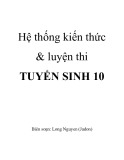
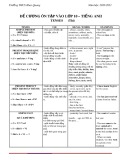

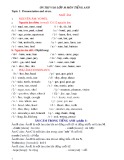
![Tài liệu ôn luyện Tiếng Anh vào lớp 10 [năm học]: Tuyển tập mới nhất, chuẩn nhất](https://cdn.tailieu.vn/images/document/thumbnail/2020/20200706/huywong98/135x160/9391594049485.jpg)

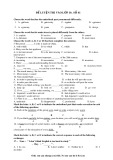
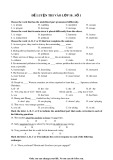



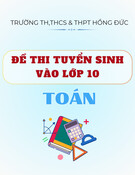
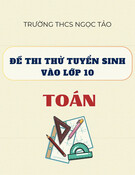
![Dàn ý và bài văn mẫu nghị luận xã hội ôn thi vào lớp 10: Tài liệu [mô tả/định tính]](https://cdn.tailieu.vn/images/document/thumbnail/2025/20250824/levanphuong15081979@gmail.com/135x160/23851756089220.jpg)
